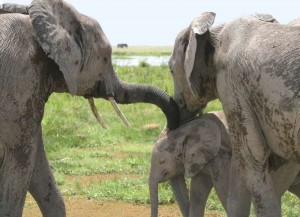Even elephants can have feelings too!
Elephants are one of the most highly intelligent animals in the world. They are among the most emotionally expressive creatures! Elephants experience an array of emotions similar to human beings such as sadness, joy, love, jealousy, fury, grief, compassion and distress. (Keet) Studies have shown that, relative to other animals including humans, they exhibit a high degree of social complexity and deep feeling. (Joyce H. Poole, 2008)
Elephants are remarkable creatures who can express particularly complex emotions such as sadness and grief. Elephants are one of the rare species of mammals other than humans who are known to perform recognizable ritual around death. (Goldman, 2012) Unlike most animals who would probably leave the weak behind to fend for themselves, elephants show signs of distress in such situations and they exhibit behaviours associated with grief over the dead for an extended period of time.
These highly intelligent creatures have one of the most closely knitted societies of any living species. They live in a fluid, fission-fusion matriarchal society, where strong and lasting bonds are forges. (Joyce H. Poole, 2008) When an elephant dies, its family members would engage in intense mourning and burial rituals. Some of the behaviours include touching with the trunk and feet, attempted lifting and carrying of the body or bones, mounting, feeding, body guarding, covering and burying. (Joyce H. Poole, 2008) Researchers suggested such behaviours might be act of grievance or reliving memories, or just trying to recognise the deceased. Whatever the reason, the sheer interest of the dead is evidence that elephants have the concept of death. (Restivo, 2010)
Elephant’s ability to express sadness and grief is indeed a fascinating behaviour that is seldom seen in other animals. This is also what makes elephants unique amongst members of the animal world.
Bibliography
Goldman, J. G. (2012, September 19). Death rituals in the animal kingdom. Retrieved April 1, 2013, from BBC: http://www.bbc.com/future/story/20120919-respect-the-dead/1
Joyce H. Poole, C. J. (2008). Elephant Sociality and Complexity : The Scientific Evidence. Elephants and ethics: towards a morality of coexistence. , 69-98.
Keet, A. (n.d.). Elephant Emotions – Grieving. Retrieved April 1, 2013, from andrews-elephants: http://www.andrews-elephants.com/elephant-emotions-grieving.html#.UVjXUJNvArU
Poole, J. H. (1996). Coming of age with elephants : A memoir. New York: Hyperion Press.
“Elephants Mourning” by NationalGeographic Youtube Channel, 19 Oct 2007. URL : http://www.youtube.com/watch?feature=player_embedded&v=TjtrdpSwEUY (seen on 1 April 2013)
Restivo, J. (2010, October 17). Echo: An elephant to remember – Elephant Emotions. Retrieved April 1, 2013, from Nature: http://www.pbs.org/wnet/nature/episodes/echo-an-elephant-to-remember/elephant-emotions/4489/
“Matriarchs decide when to associate with other families – here members of the AAs greet some of the JAs” by Vicki Fishlock, 9 June 2011. URL: http://www.elephanttrust.org/sites/elephanttrust.org/files/node_images/AAs%20greet%20JAs.jpg (seen on 8 April 2013)
